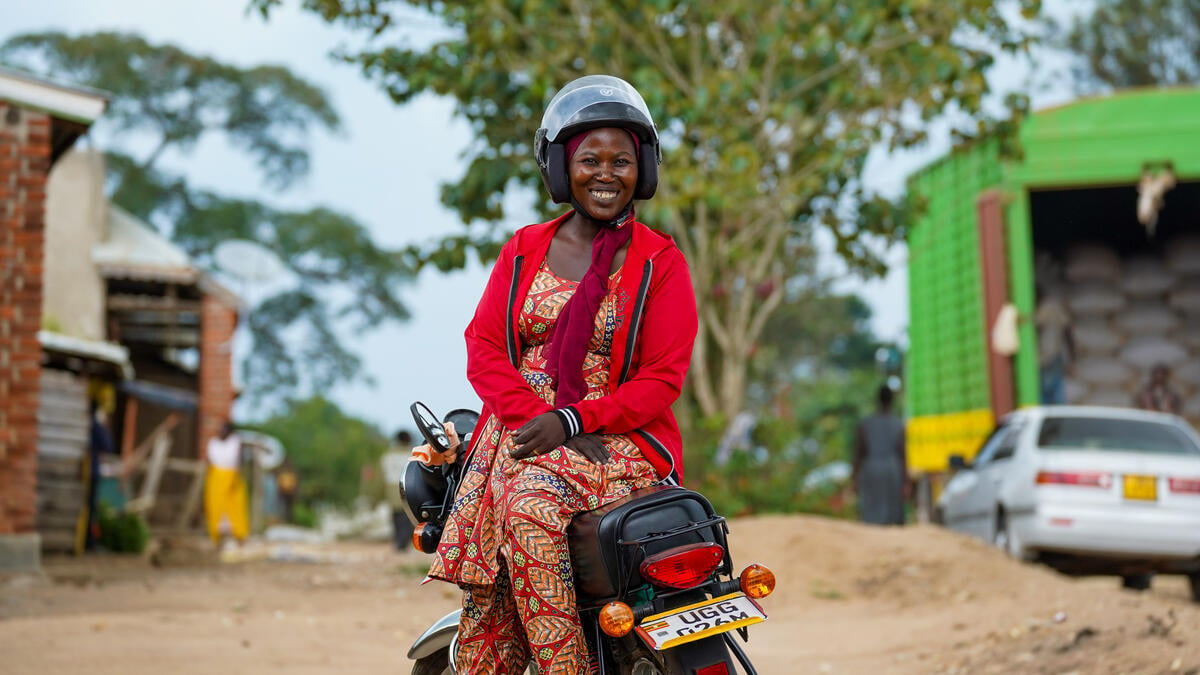Romania's "Oprah Winfrey" uses TV to shine a spotlight on refugees
Romania's "Oprah Winfrey" uses TV to shine a spotlight on refugees

Mbela Nzuzi interviews a guest on her chat show.
BUCHAREST, Romania, February 5 (UNHCR) - In the bustling television studio moments before a live talk show about stress in Romanian society, host Mbela Nzuzi exudes her usual air of professionalism and warmth, and shows not a trace of nerves.
The hour-long programme, "Restart Romania," is a doddle for the 36-year-old, who faced tougher challenges starting a new life in Romania after fleeing Democratic Republic of the Congo (DRC) during the dictatorial rule of the late President Mobuto Sese Soko.
Today she is a TV star - dubbed the Oprah Winfrey of Romania - and the only African presenter on local television, whose grasp of the Romanian language has helped to boost her popularity. "I understand people's jokes here, which is very important," she says.
"People feel that I'm one of them, colour and nationality do not really come into question anymore," adds Nzuzi, who fled her home country with her husband in 1997 after he came under attack for his political activities.
The couple were offered a safe haven later the same year by Romania, which only began opening its doors to refugees in 1991 after the fall of the communist regime. There are currently more than 1,000 refugees in Romania, which in 2008 also opened Europe's first emergency transit centre in Timisoara to provide temporary shelter for refugees in urgent need of evacuation from their first asylum countries.
Nzuzi was only 21 years old and lacked a degree and employment experience when she arrived in Bucharest. She had been a housewife in Congo and left her three-year-old daughter at home with relatives. The child is now studying in France.
The hard realities of life as an asylum-seeker in a country so different to hers might have crushed Nzuzi's ambitions. She had to navigate through a web of bureaucracy in a language that was completely alien. She found everything from Romania's culture and cuisine to its freezing winters hard to cope with.
The young woman started singing in an African band named "Gloria," which she and her husband established mainly for the refugee community. They attracted little attention at first, but the breakthrough came in 1999 when UNHCR involved the group in a campaign to increase public awareness about refugees.
Things started to look up. In 2001, Gloria released a first album and the following year Nzuzi became the president of the Refugee Women's Organization in Bucharest. After a series of guest appearances on various television shows, her wit and charm landed her a job in 2005 as a presenter on "Nasul," a famous talk show.
Soon, Nzuzi's easygoing manner and generous smile, both on and off-screen, were making positive headlines, and the success of her talk show, "Ciao Mbela," saw her referred to as Romania's Oprah Winfrey, after the popular African-American media personality.
But Nzuzi's friends and colleagues say there is much more to her than being the most famous black face on Romanian television. Anca Lapusneanu, editor-in-chief of VIP magazine, calls Nzuzi "a true social model," praising her continuing involvement with refugees and her engagement with issues facing all of Romanian society.
Local media often hail the African's ability to always see "the glass half full," despite the hardships she has suffered, an outlook that gives Romanians a fresh perspective on their own lives.
"She attracts attention as soon as she steps into a room. It's her optimism and vitality which shines through, despite having had to start from scratch here," says Lapusneanu.
"People like her are rare," says Gizella Somlea, a neighbour and friend of Mbela. "She adapted to a world which is not easy and she showed what she can do. Nzuzi made a name for herself in a place where no one knew her."
Nzuzi is still a refugee and has been back to Africa once to see her parents in Gabon, but has no plans to return. She admits that she is surprised by her success and with what she has achieved since arriving in a cold, strange Romania 15 years ago.
In that time, she has done more than any individual to raise awareness about refugees in a country that is still getting used to them. "Yes, I am proud of myself. I am a novelty in Romania," she says. "If I were in France for instance, it wouldn't have been the same - they went through this experience with refugees a long time ago."
UNHCR staff member Gabi Leu has known Nzuzi ever since she and her band first worked with the refugee agency. She has only praise for this remarkable woman.
"Mbela is an outstanding example of a refugee success story after years of learning, absorbing the local culture and working hard. She is a symbol of a refugee who made it in Romania, despite the difficulties and she rarely talks about the hard times," Leu says, adding: "We always mention her when we talk about the bright side of refugee integration - willingness to succeed and a huge return on the investment made in integrating refugees."
By Andreea Anca
in Bucharest, Romania









